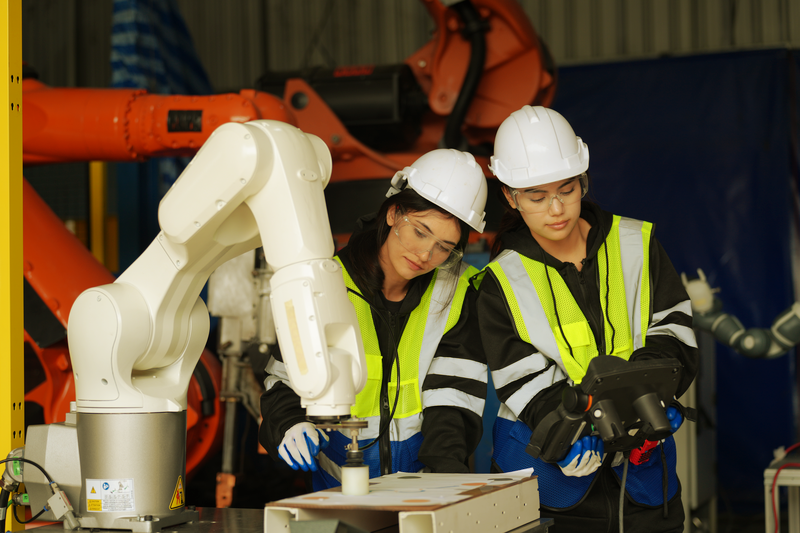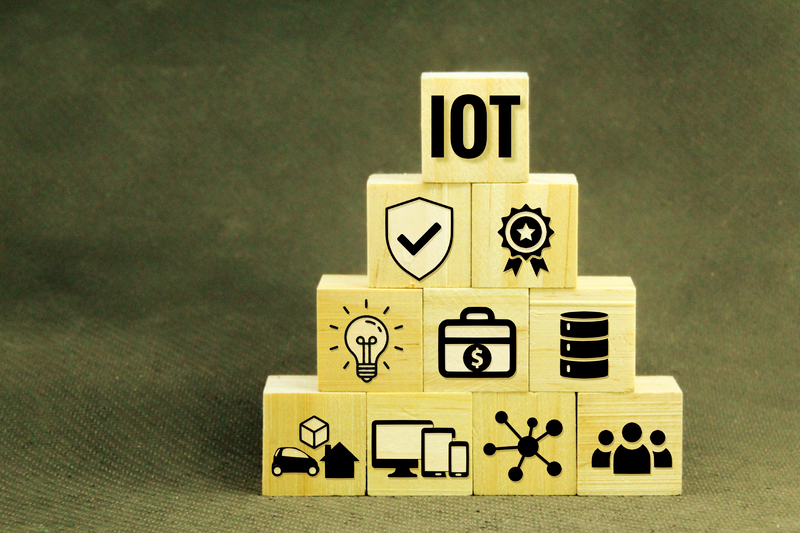Are you looking to streamline your manufacturing processes? Are you often faced with the complexity of managing multiple systems and technologies, with efficiency always seeming out of reach? You might feel frustrated, knowing your production capabilities could be better, faster, and more cost-effective, but not having the tools to make that a reality.
We’ve all watched opportunities slip through our fingers due to outdated methods. WillDom specializes in integrating IoT solutions tailored for manufacturing environments like yours. We’re here to guide you in embracing these innovations and leading in your industry.
What Is IoT?
IoT is a network of interconnected devices that communicate and exchange data with each other and with central systems over the Internet.
In the manufacturing context, this means machines, tools, and products equipped with sensors and software, enabling a level of digital intelligence and connectivity that was once unimaginable.
Essential Components of IoT in the Manufacturing Industry
There are various digital transformation myths about IoT and its foundations. The Internet of Things (IoT) in manufacturing is built on several foundational components that work together to collect data and unlock new productivity levels. Each plays a critical role in ensuring that systems are operational and in optimal condition.
Here are four essential components of the Internet of Things in manufacturing:
#1 – Connected devices
Connected devices are business process automation tools that serve as the eyes and ears of the IoT ecosystem in manufacturing. These include sensors, machines, and other equipment embedded with technology that allows them to collect and transmit data. The insights gathered from these devices drive decision-making and operational improvements, making them indispensable for modern manufacturing setups.
#2 – Digital communication infrastructure
The digital communication infrastructure serves as the nervous system of an IoT setup, facilitating seamless data transfer between devices and centralized systems. This infrastructure includes network hardware and protocols that ensure connectivity and communication across diverse environments, whether wired, wireless, or cloud-based.
#3 – Software and analytics
At the core of IoT’s functionality is the software and analytics component, which acts as the brain of the operation. This software interprets the vast data streams sent from various devices and uses analytics to turn this data into actionable insights. Advanced algorithms and machine learning models can predict maintenance needs, optimize production schedules, and enhance quality control.
#4 – People
Despite the high level of automation in IoT systems, human input remains crucial. People must set goals, interpret data, make decisions, and manage the Internet of Things infrastructure. This component includes everyone from on-the-floor operators interacting directly with IoT-enabled machinery to IT specialists managing the network.

How Does IoT Benefit Manufacturers?
Adding IoT to your digital transformation plan offers substantial benefits that improve day-to-day operations and drive long-term business growth by connecting and enhancing various manufacturing process components.
Here are six key benefits that manufacturers can achieve through effective Internet of Things implementation:
#1 – Enhanced inventory tracking
IoT systems provide real-time visibility and tracking of materials and products as they move through the supply chain. Sensors and RFID tags can automatically record the quantity and location of inventory, reducing manual counting errors and the need for physical checks. This leads to more accurate stock levels, optimized reordering processes, and reduced holding costs.
#2 – Improved quality control
Sensors and cameras on the production line can continuously monitor and analyze the quality of products as they are being manufactured, detecting deviations from standards immediately. This real-time monitoring helps identify and rectify defects early in production, ensuring that only products meeting quality specifications reach customers.
#3 – Efficient facility management
IoT enables more competent facility management by using sensors to monitor conditions and operations within the factory. This includes energy consumption, equipment performance, and environmental conditions like temperature and humidity. Data collected from these sensors can be used to optimize energy usage, improve facility conditions, and ensure compliance with health and safety regulations.
#4 – Real-time data
Manufacturers can monitor every aspect of the production process, from machine performance to workflow efficiency, and receive instant alerts if issues arise. This immediate insight allows quick decision-making and adjustments, enhancing operational agility and reducing downtime.
#5 – Predictive maintenance
Predictive maintenance allows manufacturers to anticipate equipment failures before they occur. By analyzing data from machines, IoT systems can identify patterns or anomalies that signify potential breakdowns. Maintenance can then be scheduled at convenient times, preventing unexpected equipment failures and expensive emergency repairs and extending the lifespan of machinery.
#6 – Higher customer satisfaction
Customer satisfaction is increased by ensuring faster production times and higher-quality products. IoT-enhanced supply chains can also lead to more accurate delivery estimates and fewer delays. This reliability and efficiency resonate well with customers, leading to higher retention rates, increased trust, and a more substantial brand reputation.
What Are the Challenges of IoT in Manufacturing?
While the benefits are significant, the transition to a fully integrated IoT environment is not without its challenges. Manufacturers must navigate some obstacles that can complicate deployment and effective operation.
Below are three significant challenges that manufacturers face when integrating Internet of Things technologies into their operations:
#1 – Integration complexities
Many manufacturing plants operate on a mix of old and new technologies, and not all systems communicate effectively. Upgrading these systems often requires substantial time and financial investment. This integration must be meticulously planned and executed to avoid disruptions in production.
#2 – Security and privacy concerns
Each device connected to the network represents a potential entry point for security breaches, which can lead to data theft, manipulation, or even sabotage. The privacy of sensitive company data and intellectual property is also a significant concern, as these could be compromised if not adequately protected. Manufacturers must implement robust cybersecurity measures to avoid this.
#3 – Scalability intricacies
Scalability is critical for ensuring that IoT systems can handle increased data volumes and more connected devices without performance degradation. This requires a flexible network architecture and scalable storage solutions that can grow with the company’s needs. Additionally, managing an expanding array of IoT devices and the data they generate can become increasingly complex.
How Is IoT Successfully Used in Top Manufacturing Top Companies!
Leading companies are harnessing the power of IoT to drive significant operational improvements, setting new benchmarks for manufacturing excellence. These successes provide valuable insights into the practical applications of this technology.
According to IoT World Today, these are three of the top companies that have had successful IoT industrial application implementations:
#1 – Stanley Black & Decker: Revolutionizing construction with connected technology
Stanley Black & Decker utilizes this revolutionary technology across its operations, notably increasing production efficiency by 24% in a Mexican factory. The company also monitors construction sites and tools, and its DeWalt brand has launched a Wi-Fi-based IoT system to oversee job sites and introduced theft-prevention battery technology.
#2 – Caterpillar: Leading company in IoT innovation
Caterpillar (“Cat”) leverages IoT and AR to enhance machinery operation, providing real-time data on machine status and maintenance instructions via AR apps. Their marine division uses sensor-based analytics to save costs in marine operations.
#3 – Magna Steyr: Pioneering smart automotive manufacturing
Magna Steyr uses advanced tracking and intelligent packaging to manage logistics in its automotive manufacturing processes. The company has also integrated autonomous vehicles and wearable technology to streamline assembly and has been recognized for its innovations in this field.

We Can Help You Improve Manufacturing Operations with IoT Technology!
It’s not uncommon for the manufacturing sector to feel delving into IoT could be more trouble than it’s worth. There are concerns about costs, disruptions, and the steep learning curve associated with new tech implementations. However, the reality is quite different. With the proper guidance and expertise, the transition to IoT can be smooth, with endless benefits.
That’s where WillDom comes into play. At WillDom, we build partnerships to ensure that your journey into IoT is seamless and successful. We understand the intricacies of digital transformation and are equipped with the expertise that enables manufacturers to mitigate risks, maximize efficiency, and future-proof operations.
Contact WillDom today to set the stage for more innovative manufacturing production processes with the help of IoT data!

